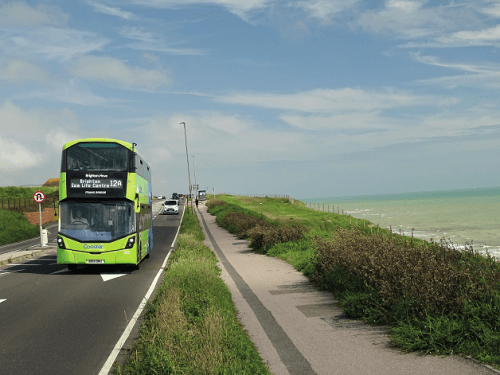The new deal will ensure services continue running as operators and local authorities work towards a sustainable future
A package worth over £150m is to be provided by the Government to support bus and light rail services across the country, building on what it called ‘unprecedented Government support for buses and light rail’ throughout the pandemic. The new funding deal aims to ensure that services will be able to continue running as operators and local authorities work towards a sustainable future.
Announced on 1 March, the funding package builds on almost two years of Government support to keep bus and light rail networks running, with around £2 billion made available to over 160 operators during the pandemic. The Government said that the latest sum will be the final tranche of pandemic-related support to operators and will run for six months until October.
The new funding is intended to support operators and authorities as they adapt to changing travel patterns, and to help the continued delivery of Enhanced Partnerships, with local authorities expected to work closely with bus companies to draw on their operating knowledge and marketing skills. Additionally, it will support local authorities and operators across England as they continue working on Bus Service Improvement Plans and delivering ‘substantive improvements’ to local services.
Transport Secretary Grant Shapps said: “The funding I’ve announced today will ensure millions of us can continue to use vital public transport services, and brings the total we’ve provided to the sector to keep services running throughout the pandemic to over £2 billion. Not only that, as we look ahead and continue our work to overhaul services and build back better from the pandemic, this funding will also help authorities and operators work together to provide even better services for people right across the country.”
The Government has promised a total investment of over £3 billion into bus services by 2025, including £1.2 billion to improve fares, services and infrastructure, and a further £525 million for zero-emission buses. Roads minister Baroness Vere said: “Millions of people rely on buses and trams to get them to work, school and the shops, which is why we have already provided billions of pounds of support for the sector throughout the pandemic. This latest funding builds on that support and will help keep services running as we emerge from Covid-19 and ensure networks meet passenger demand.”
The funding will be dependent on local areas and operators co-designing a transport network which is deemed to be financially sustainable and passenger focussed and which works for changing travel patterns post-pandemic. The Government said it will provide further details on the allocation of the funding be provided in due course.
Industry response
Graham Vidler, Chief Executive of the Confederation of Passenger Transport (CPT), welcomed the announcement: “This welcome funding will help operators have the certainty they need to run an extensive network of services over the coming months as we all adjust to life after the pandemic. In the longer term the bus network will need to adapt to meet passengers’ new travel patterns. Over the coming months operators will be working closely with local authorities to plan future bus networks and introduce plans to grow passenger numbers. To aid these local efforts we look forward to working with the Government to loudly promote bus travel.”
Go-Ahead Group’s Chief Executive, Christian Schreyer, said: “We welcome this funding for local buses, which will allow the industry time to build back passenger numbers. We’ve bounced back well from the Omicron variant, and our buses are carrying about 80% of the number of passengers they had before the pandemic. But working habits have changed, and it will take a little longer for a ‘new normal’ to settle in. In time, there are excellent prospects for bus usage to grow across Britain. Funding under the National Bus Strategy for bus lanes and priority schemes will speed up services in towns and cities, making them more attractive to passengers and allowing us to increase frequencies. If Britain is to move towards a net zero future, it is vital that people leave their cars at home and switch to public transport. This short-term finance will go some way towards bridging the gap and will help us build a broader network of successful bus services.”
First Bus Managing Director Janette Bell also welcomed the news: “We welcome Government’s recognition of the importance of transitional funding support for the bus industry and look forward to seeing more detail on the proposals. This support is vital to help maintain services for customers and communities as the recovery from the pandemic continues. Customers’ travel habits and commuting patterns continue to evolve and we will continue to work closely with local authorities to develop joint plans for our networks.”
Phil Southall, Managing Director of Oxford Bus Company and Thames Travel said: “This is welcome news and we’re very grateful our call to action was heard. It protects services in the short term at a time when people need services to return to work, education and leisure activities. But unfortunately, the cliff edge has not gone away and we still need to increase patronage by 20% come September to avoid having to make any reductions in services.”
The current average patronage across the operator’s network is 75% of pre-pandemic levels. The firm stated that this figure would need to reach 90% by September to fully protect services when the funding expires. Phil added: “It remains unclear how much patronage will fully recover to, and it’s crucial we use the next six months to rebuild in earnest, in partnership with key stakeholders including the City and County Council. The more patronage we get back, the less impact there will be on services come the end of September. There won’t be any immediate changes in our services, but we now need as many people as possible to return to using the bus wherever possible.”


